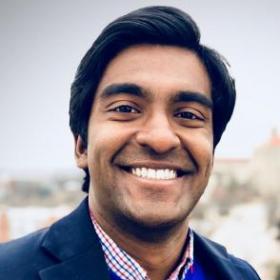Dedicated to Serve
Wait… Has it really been a year? Wow. What a year of service it has been!
My year as a Health Educator with National Health Corps (NHC) Chicago has been one of the most fulfilling experiences I have had. I was fortunate to travel to the diverse neighborhoods of Chicago, listen to the stories of people from those communities and connect them with effective health resources. Moreover, my service experience has been exponentially heightened by collaborating with and being inspired by my colleagues who will lead the future of healthcare.
If I've gained one thing from NHC Chicago, it's that I've become more flexible. Each day has a new set of tasks and challenges with our goal focused on providing better health access to empower patients. I am reminded daily of the complexity and emotional demands of patient care.
Through NHC Chicago, I educated underserved populations and provided access to preventative health information. I presented to audiences interested in sexual and mental health and met one-on-one with patients for nutritional health coaching. I found a passion in health education and motivational interviewing because my patients felt empowered to make informed decisions for their health. When patients improved with their health understanding, I was proud knowing my efforts helped a person have a better health outcome. I witnessed how access to care impacts a person's ability to achieve their goals. The CEO of my clinic taught me about how non-profit clinics operate on the clinical, fiscal, and federal advocacy levels. And I saw the impact health initiatives have on addressing issues common in medicine. Even though medical advances lead to life-saving treatments, providing access through health policy and advocacy are complementary ways to sustain infrastructure to eradicate preventable diseases.
Overall, this year has been busy and eye opening. I've come to understand how healthcare is a multifaceted issue influenced by the'Iron Triangle," a term coined in William Kissick's book Medicine's Dilemmas: Infinite Needs Versus Finite. What Kissick explains is that healthcare is influenced by cost of care, quality of care, and access to care.
Evaluating Chicago's health trends, I noticed how much negative health outcomes overlap with variables such as proximity to healthy grocers and community clinics, as well as socioeconomic status. I learned how these variables influence access to high quality care and commonly lead to higher rates of asthma, diabetes, and heart disease. Most of the patients I served were from underserved communities, and I realized that non-health related variables ultimately influence health outcomes. Moreover, I learned how barriers such as access to transportation affect access to a medical card or food stamps. Patients with health problems from underserved communities have a more difficult time working and studying to escape poverty and as a result continue to have low health outcomes. An earlier study found that the life expectancy of people living in the Northeastern parts of Chicago ranges from 80-83, while life expectancy for residents from Southwest Chicago is 67-73. How is this possible?
Early in my service experience, I was set on solely being a clinician. By the end of my service term, I've learned that I can still provide clinical services and also work with other passionate leaders to provide equitable care. By acknowledging this'Iron Triangle" we can work to modify the paradigm of healthcare in this country.
As a health educator, I not only consulted patients on health topics but I had to ensure their compliance by providing area specific resources. I felt fulfilled providing health resources to my patients because they could have better health outcomes instead of being subject to an unjust system. This experience solidified my interest in dedicating my future practice to providing equitable access to care for vulnerable populations.
I have NHC Chicago to thank for the paradigm shifts in my professional and personal goals. I started out as a humble learner, and leave with newfound confidence that, with the right team of passionate healthcare leaders, we can help address healthcare problems in the community. Isn't that what we should be striving towards? A time when people don't have to struggle to make decisions of whether or not they can receive quality healthcare. NHC Chicago taught me that medicine is dedication to service and that it is possible through multiple avenues, not just a clinical practice. I want to serve people by providing options for them to take control of their health, and also undertake public health initiatives heeding a new path to meet the needs of future patients.

This blog post was written by NHC Chicago 2018-19 member Vivek Panchananam.
Vivek is a Health Educator at Erie Family Health Center - Amundsen.